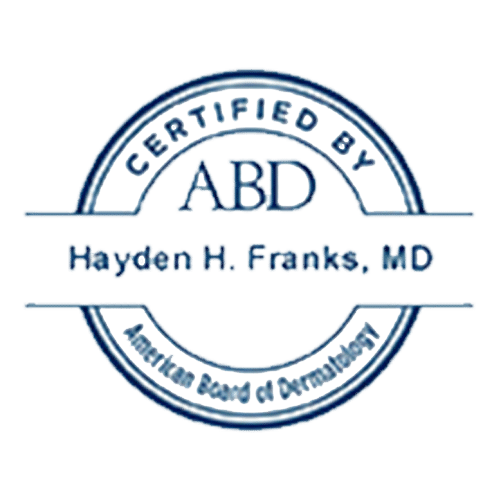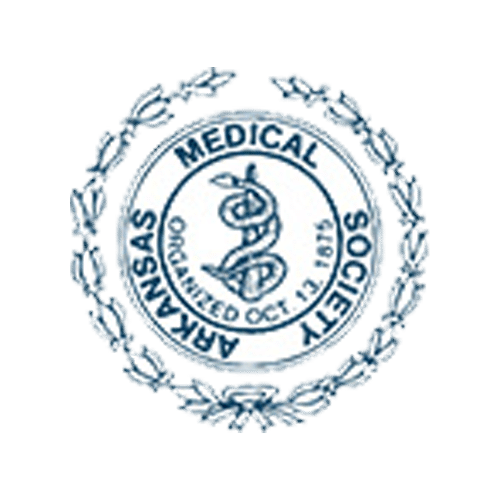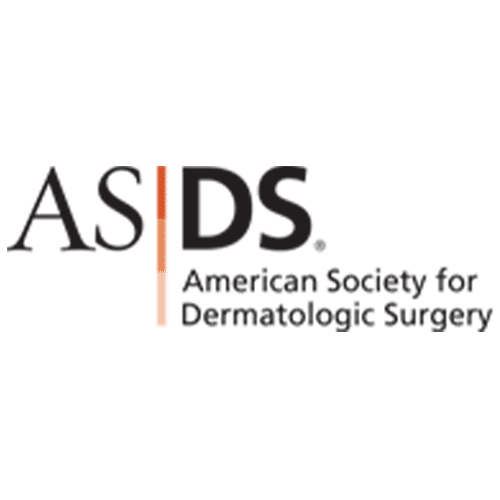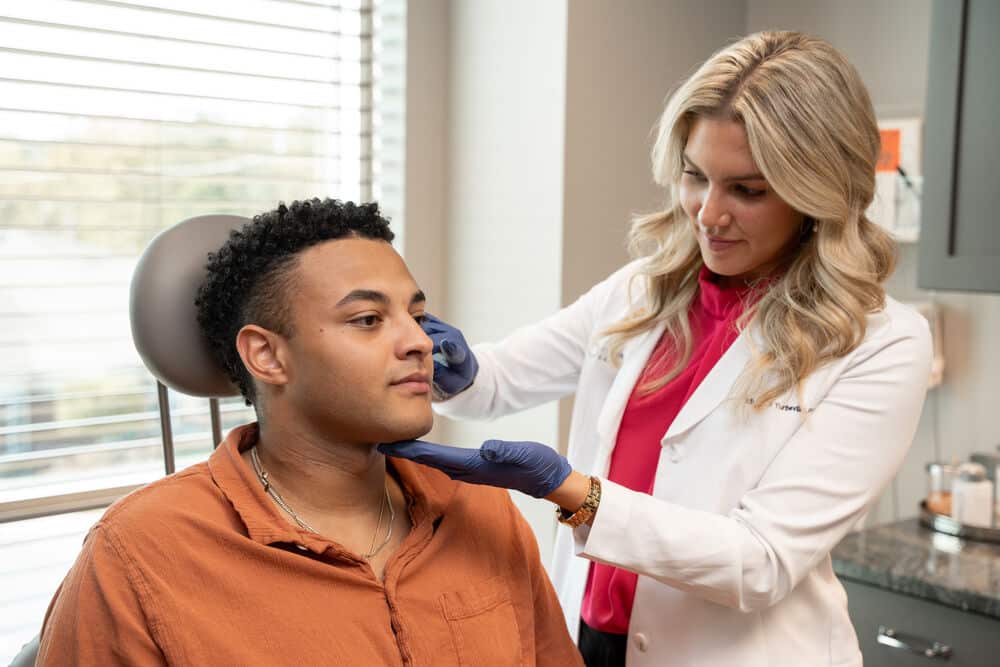Comprehensive Acne Treatment
Franks Dermatology clinic in Little Rock specializes in personalized acne treatments for patients across Arkansas. We help you achieve clear skin and a confident smile.
Franks Dermatology
acne treatment guide
Acne is a common skin condition that can affect people of all ages, impacting both skin health and self-confidence. It often arises due to factors like hormones, genetics, and lifestyle habits. At Frank's Dermatology, we offer a wide range of solutions—from practical at-home care tips to advanced dermatological treatments—tailored to meet each patient’s unique needs and help them achieve healthier, clearer skin.
Acne Treatment Guide Table of Contents
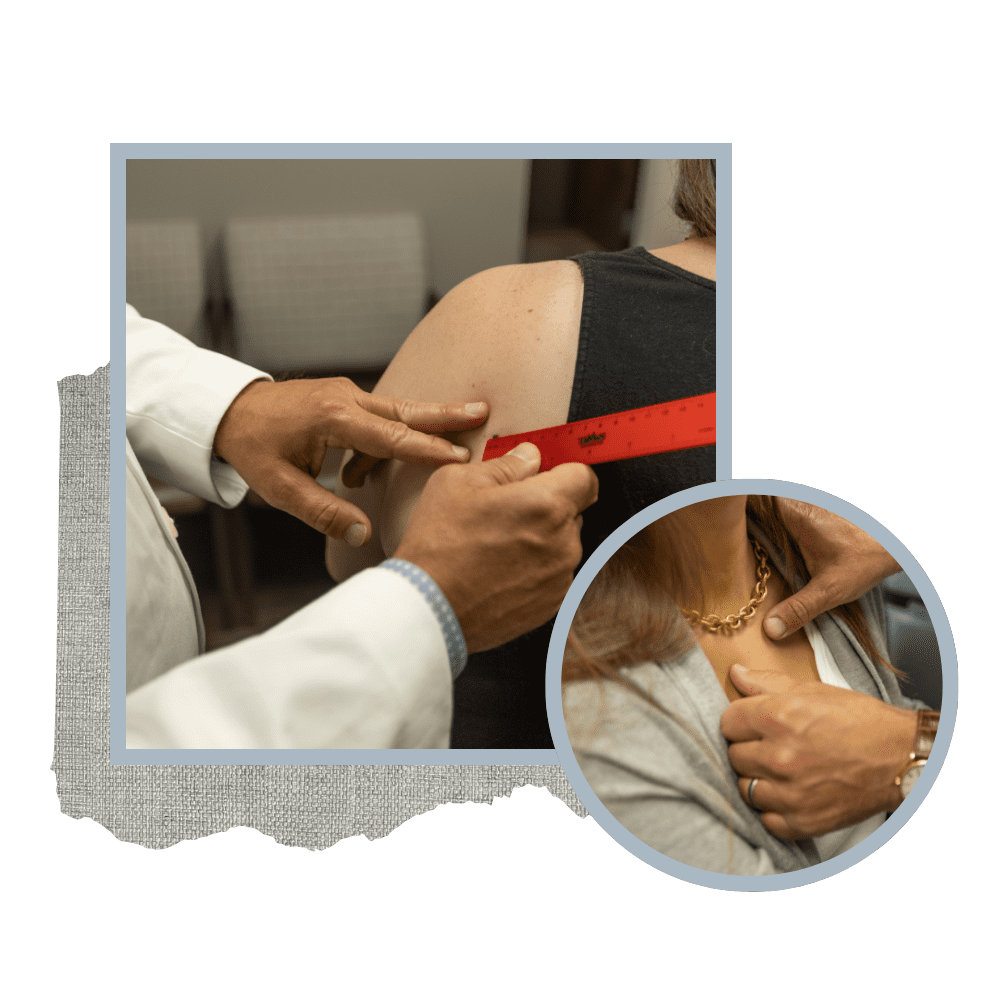
"Dr. Franks is just outstanding! He truly cares about each of his patients. He makes a point to get to know you. Highly recommend this office. MY ACNE IS CLEAR!!!" - Kendall Case, Little Rock, AR
Acne Treatment
Understanding acne and its causes
Acne is a common skin condition that occurs when hair follicles become clogged with oil, dead skin cells, and bacteria. This leads to breakouts such as blackheads, whiteheads, and pimples. Several factors contribute to acne, including hormones, genetics, and lifestyle habits. Hormonal changes during puberty, pregnancy, or stress can trigger excess oil production. Genetics may also make some individuals more prone to persistent acne.
Lifestyle choices can worsen acne symptoms. Diets high in sugary or dairy-rich foods may aggravate breakouts in some people. Poor skincare routines, harsh products, and frequent face-touching can further irritate the skin. Understanding these causes is essential for developing an effective, personalized treatment plan.
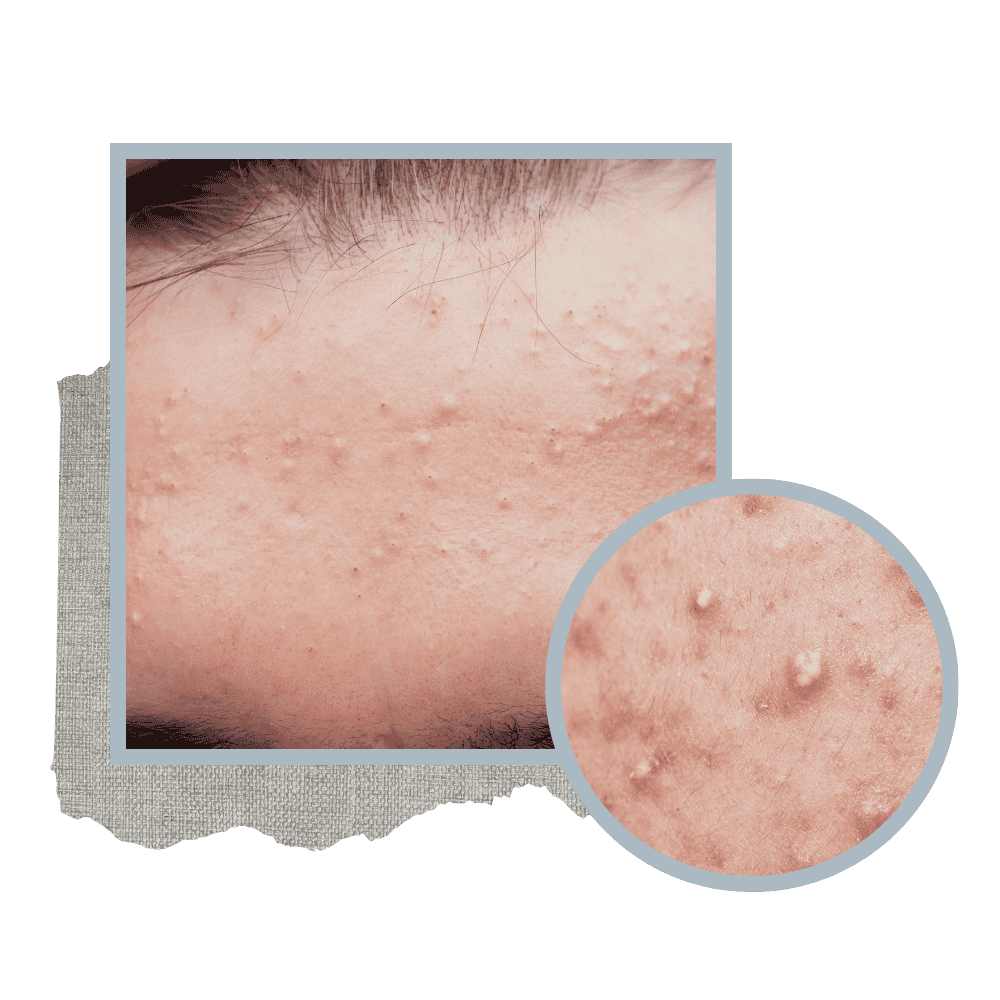
IDENTIFYING
TYPES OF ACNE
Acne can present in different forms, each varying in severity and appearance.
- The most common types include blackheads and whiteheads, which occur when pores become clogged with oil and dead skin cells. Blackheads remain open, giving them a dark appearance, while whiteheads are closed, forming small, white bumps.
- Papules and pustules are inflamed pimples that appear red or swollen, with pustules often containing a visible white or yellow center.
- More severe types of acne include nodules and cystic acne, which develop deep under the skin and can be painful, leading to scarring if left untreated.
Understanding the different types of acne is essential for determining the most effective treatment options.
Acne Treatment Options
Over the counter, RX, or in-office
There are a variety of treatment options available to effectively manage and reduce acne, depending on its severity and type.
- Over-the-counter solutions, such as cleansers and topical treatments containing salicylic acid or benzoyl peroxide, can help control mild breakouts.
- For more persistent or severe cases, prescription treatments like retinoids, oral antibiotics, or hormonal therapies may be recommended.
- In-office procedures, including chemical peels, laser therapy, and extraction techniques, offer advanced solutions for stubborn acne and scarring.
Combining the right treatments with a consistent skincare routine can significantly improve skin health and appearance.
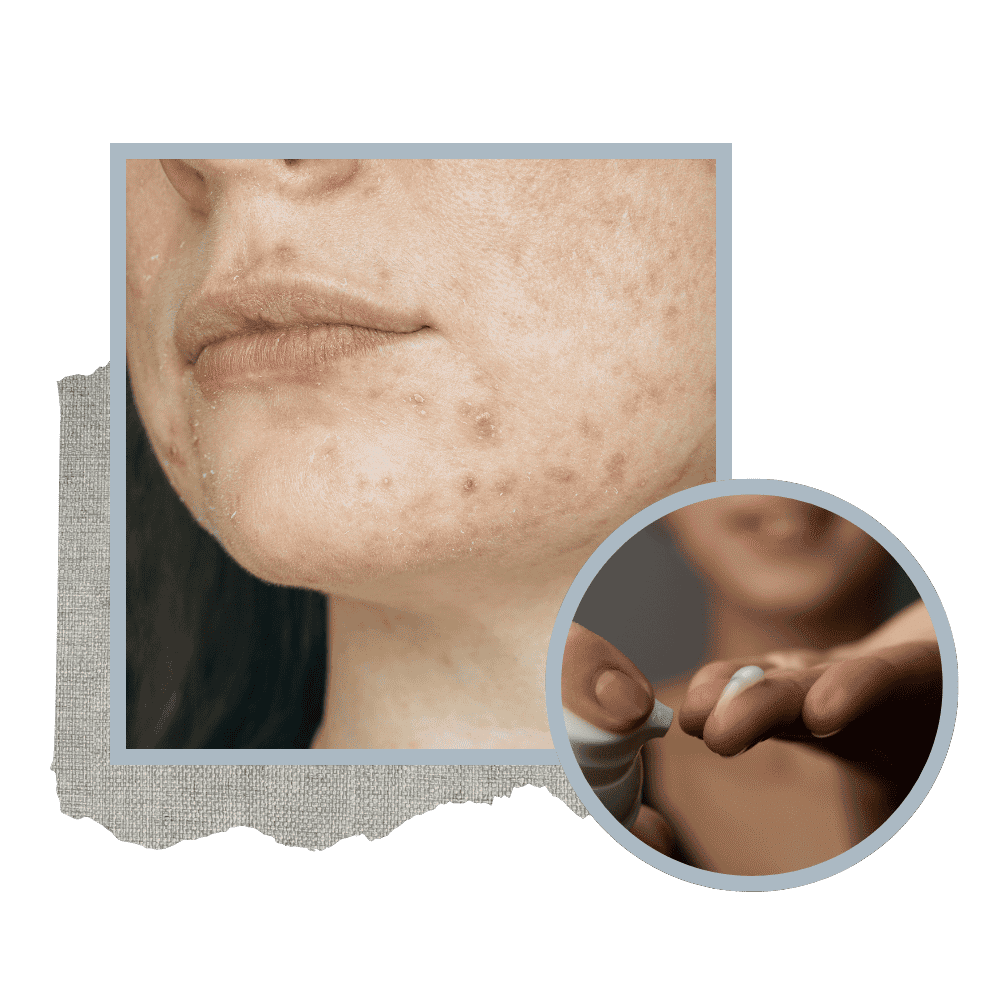
Prescription Treatments
For Acne
For moderate to severe acne, prescription treatments can provide effective, targeted solutions.
- Topical retinoids, such as tretinoin, help unclog pores and promote cell turnover, reducing breakouts over time.
- Oral antibiotics are often used to control inflammation and bacteria, while hormonal treatments, like birth control pills or anti-androgens, can help balance hormone-related acne.
- For severe cases, isotretinoin (commonly known as Accutane) is a powerful option that targets oil production and prevents new acne from forming.
These treatments are best prescribed and monitored by a dermatologist to ensure safe and effective results for acne-prone skin.
acne treatment
Lifestyle & At-home remedies
Managing acne often starts with simple lifestyle adjustments and a consistent at-home skincare routine.
- Cleansing: Gentle cleansers, non-comedogenic moisturizers, and topical treatments with ingredients like salicylic acid or benzoyl peroxide can help keep breakouts under control.
- Note: Avoiding harsh scrubs, touching your face, or picking at pimples is essential to prevent irritation and scarring.
- Lifestyle: Additionally, maintaining a balanced diet by reducing high-glycemic foods and dairy may improve skin health for some individuals. Incorporating stress management techniques, like exercise or meditation, can also reduce flare-ups triggered by hormonal changes.
These small yet effective steps, combined with professional advice, can make a noticeable difference in managing acne.
Some of our favorite facial cleansers?
- Cerave
- Cetaphil
- Vanicream
Franks Dermatologists have found these facial cleansers to be both gentle and effective.

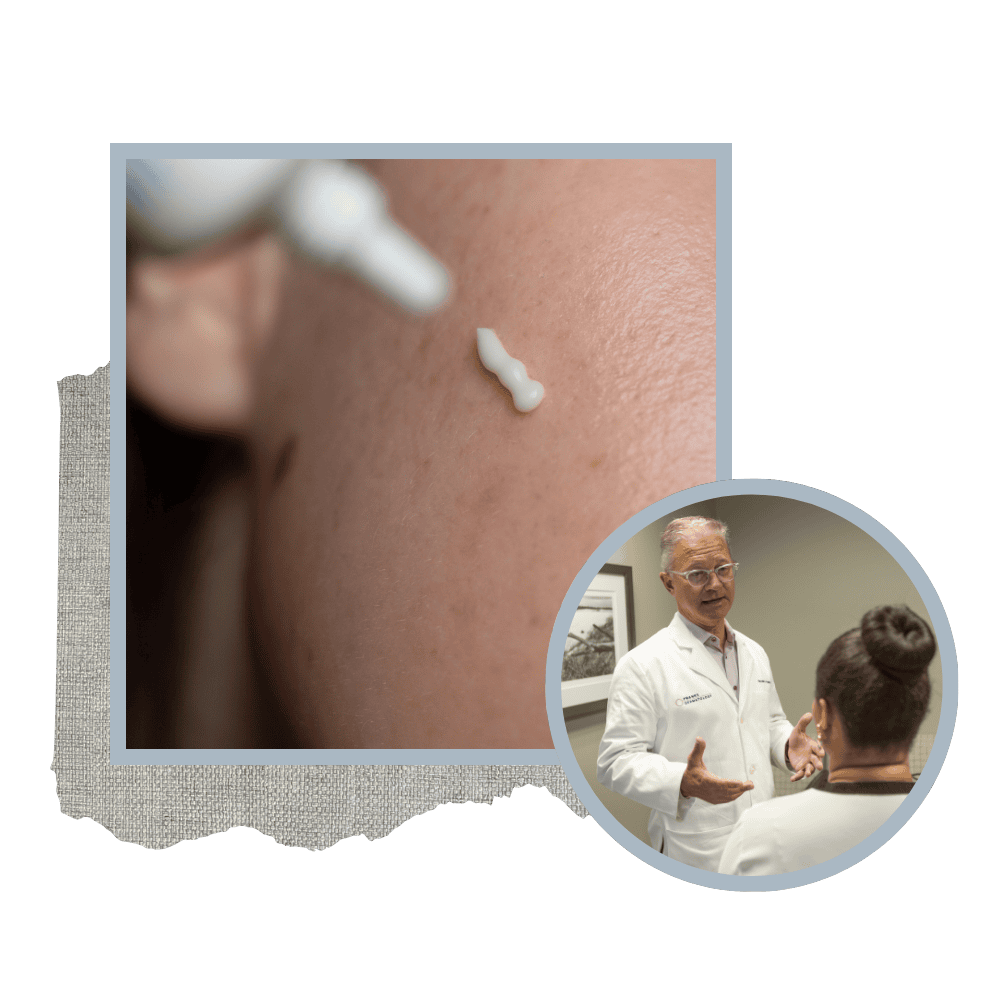
Acne Treatment
Myths & Facts
There are many misconceptions about acne that can make managing it more challenging. So, let's dig in to those here.
A young problem:
One common myth is that acne only affects teenagers; in reality, adults can struggle with acne well into their 30s, 40s, and beyond.
Cleansing:
Another myth is that poor hygiene causes acne, but over-washing the face can actually irritate the skin and worsen breakouts.
Popping:
People often believe that popping pimples helps them heal faster, but this can lead to infection, scarring, and prolonged inflammation.
Everyone's the same:
It's a myth that everyone gets the same kind and amount of acne. However, genetics and hormones play a major role in acne development, and effective treatments require a tailored approach.
Tanning:
Many people believe tanning or sunning can reduce acne. However, the sun and tanning may just dry out the skin and cause acne spots to be hyperpigmented. This can lead to more apparent scarring.
By separating myths from facts, individuals can make informed decisions and seek the right care to achieve clearer, healthier skin.
gain confidence with clear skin
How Franks Dermatology Can help
At Frank’s Dermatology, we specialize in providing expert, personalized care to help you achieve clear, healthy skin. Our team understands that every patient’s acne journey is unique, which is why we offer tailored treatment plans that combine advanced dermatological solutions with practical at-home care. From mild breakouts to severe acne, we provide a range of effective options, including topical treatments, prescription therapies, and in-office procedures.
Take the first step toward clearer skin today.

"This was my first ever dermatology visit! I decided to go to Franks because I saw so many good reviews. My doctor was Bailey, she was really nice and listened to all my concerns. I went to visit her about eczema, acne, and hyperpigmentation.
She is now treating my acne with doxycycline and clindamycin along with my tretinoin .05% and my eczema with a topical non-steroid named opzelura. Would recommend anyone come here!"
- Brianna Bass, Little Rock, AR
Frequently Asked Questions
about acne & acne treatment
What causes acne?
Acne can be caused by a variety of factors, including hormonal changes, excess oil production, clogged pores, bacteria, and genetics. Lifestyle factors, such as diet and stress, may also play a role.
What are the different types of acne?
Can acne be treated at home?
When should I see a dermatologist for acne?
Are there in-house treatments for my acne?
What prescription treatments are available for acne?
Do certain foods cause acne?
Can stress make acne worse?
Is it okay to pop pimples?
What are the best treatments for acne scars?
How long does it take for acne treatments to work?
Does wearing makeup make acne worse?
Can adults get acne?
What can I do to prevent future breakouts?

